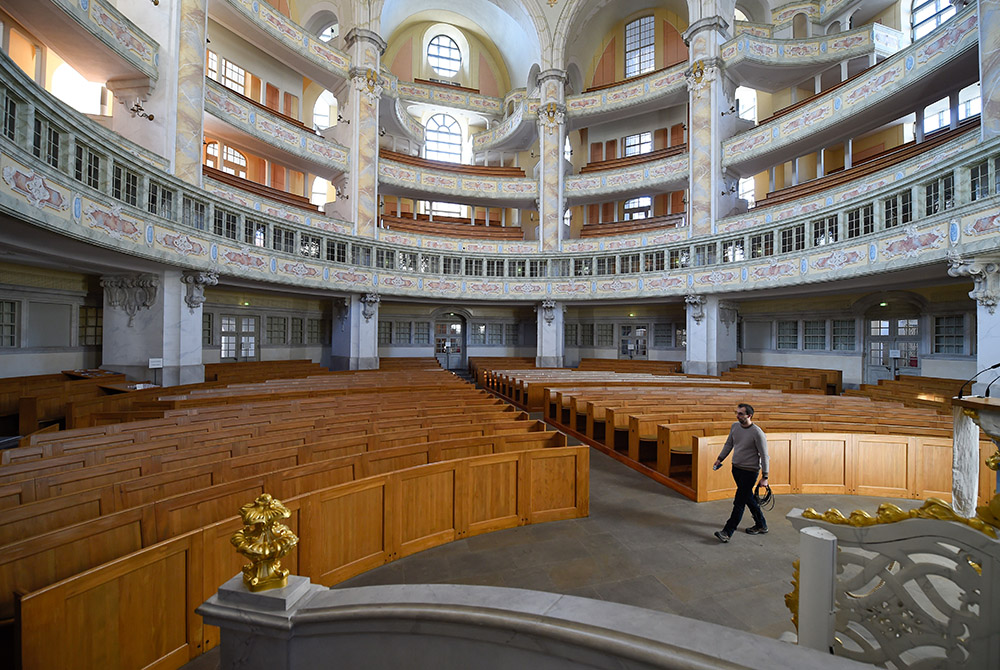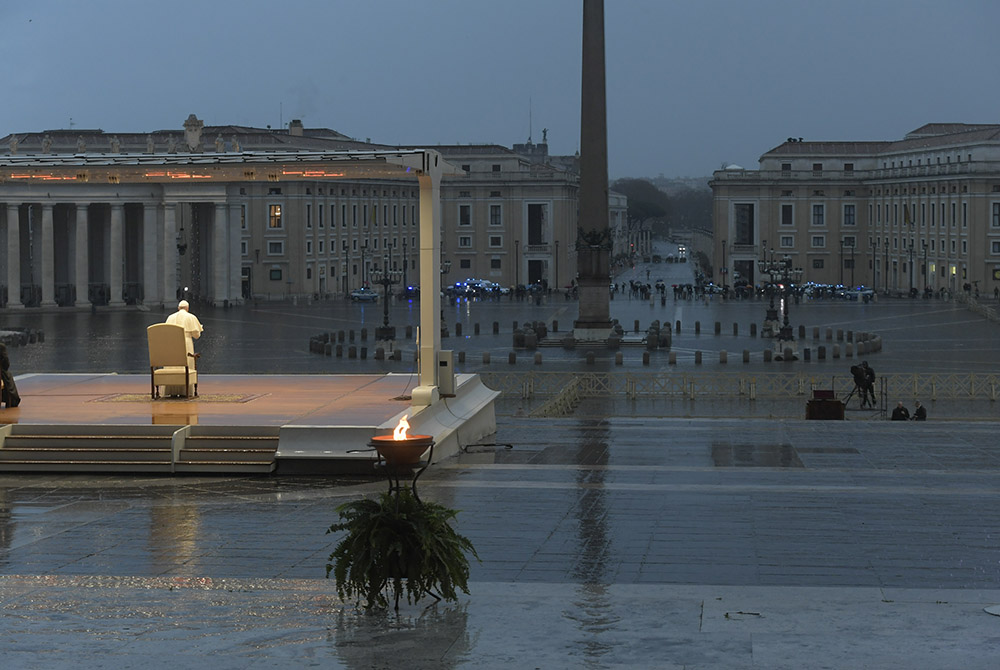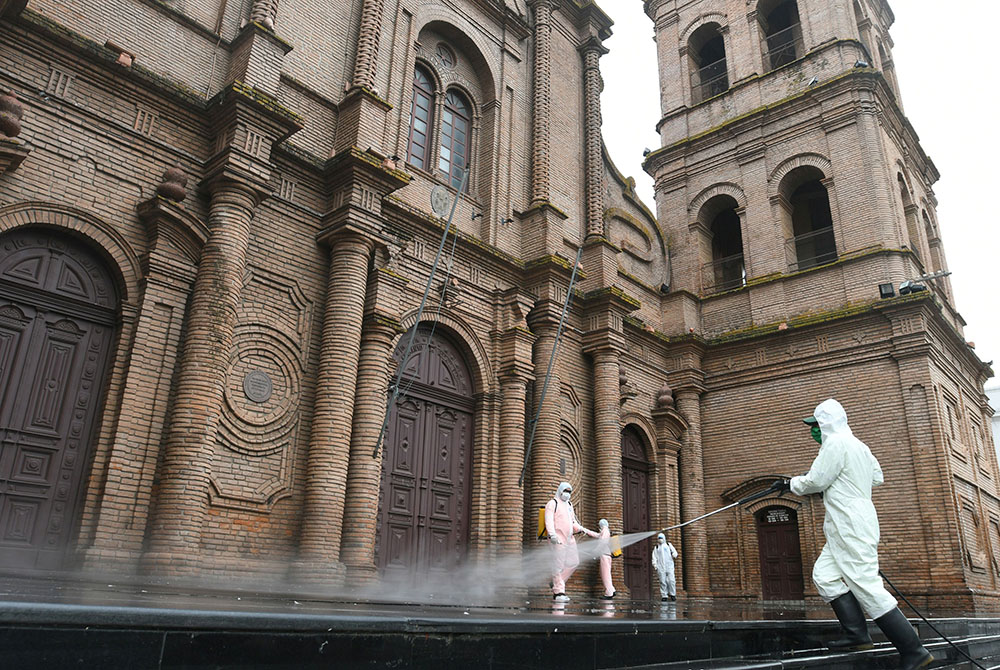
A technician walks inside the empty Church of Our Lady in Dresden, Germany, March 23 amid the coronavirus pandemic. (CNS/Reuters/Matthias Rietschel)
Over the last two weeks, I have read a lot of disturbing articles and social media comments decrying the widespread decisions of bishops (including the bishop of Rome, Pope Francis) to suspend the public celebration of liturgies and, in many cases, to close church buildings. That choice, painful as it has been for both the ecclesial leaders who had to make it and those who have felt the consequences, arose from the universal consensus of the best medical and public health experts.
And yet, some Catholic media commentators and even a cardinal have proposed that churches should remain open, Eucharistic liturgies and the individual form of the sacrament of penance should be celebrated, and even public processions with or without the Blessed Sacrament should be organized in the streets.
Some self-styled conservatives are attempting to serve both God and mammon, arguing in theologically dubious ways that following the guidelines of the World Health Organization and the U.S. Centers for Disease Control and Prevention is a capitulation to "sentimentalism," "fear of death," "secularism," "death's dominion," "materialism" and a host of other ungodly dispositions and priorities. While these concerns are couched in the language of religious freedom and piety, there is often an economic or social motivation hidden in plain sight. Some of the most revolting arguments have taken the form of "sacrificing" the lives of some for the "protection" of the economy for all, as NCR political columnist Michael Sean Winters has recently summarized.
Such reckless disregard for the necessary quarantine protocols and social distancing practices required to provide some basic measures to help stem the spread of the novel coronavirus and prevent healthcare systems from being irreparably overwhelmed is, frankly, abhorrent.

Pope Francis leads a prayer service in an empty St. Peter's Square at the Vatican March 27. (CNS/Vatican Media)
These sorts of contrarian arguments are emblematic of a small but vocal crowd of pandemic naysayers in the church that, wittingly or otherwise, reduce everything from church buildings to even the Eucharist itself into symbols of a growing idolatry that minimizes God and restricts God's presence to a limited number of discrete locations. It's true that Christ is uniquely present in the Blessed Sacrament, but it's not true that this is the only way God draws near to humanity and the rest of creation. God's grace is not scarce nor is God distant from us!
I don't in any way mean to minimize the true psychological distress and spiritual pain that comes with the prolonged inability to worship and celebrate the sacraments in person (this should give all of us a greater sense of solidarity with those who knew this kind of suffering long before the pandemic, such as those women and men in the Amazon region). But we have to distinguish between legitimate and illegitimate fear, righteous and self-righteous anger.
The fear shared by some people and stoked by right-wing political and religious commentators asserts that the lack of access to church buildings or to the church's public worship therefore means lack of access to the divine. The anger expressed in essays and social media posts demanding the return of public liturgies and ready access to worship spaces is fueled by this mistaken logic and fear. These are neither legitimate nor righteous positions.
Such a worldview sets up an oppositional framework that pits God against creation, the church against the world, and the love of God against the love of neighbor. Such thinking is small and petty, leading the aggrieved to assume that the care showed to their neighbors by following the public health directives to stay home and practice social distancing is in a zero-sum competition with love of God.

Workers in protective gear clean in front of Metropolitan Cathedral in Santa Cruz, Bolivia, March 26 amid the coronavirus pandemic. (CNS/Reuters/Rodrigo Urzagasti)
But this is not the only way we have to think theologically about the important and extreme measures we are taking today for the love and safety of others. Rather than think about a potential conflict between practicing love of God and love of neighbor, perhaps we would do well to recognize the inherent unity between the two expressions of caritas (love).
To help us think through this, it is worth returning to a 1965 lecture that theologian Jesuit Fr. Karl Rahner gave to a nonprofit organization in Cologne, Germany. The lecture, published in English in volume six of his Theological Investigations, is titled: "Reflections on the Unity of the Love of Neighbor and the Love of God."
Rahner argues that we have for too long bifurcated these two expressions of love, acting as if what we do for God is one thing and what we do for our sisters and brothers in the world is another.
Drawing on scripture and interpreting the medieval theological tradition, Rahner explains that we ought to consider acts of love of neighbor as also real acts of love of God, even if we are not thinking of God in an explicit way at the time. He writes:
This means, therefore, that the love of neighbor is not merely the preparation, effect, fruit and touchstone of the love of God but is itself and act of this love of God itself; in other words, it is at least an act within that total believing and hoping surrender of man to God which we call love and which alone justifies man, i.e., hands him over to God, because, being supported by the loving self-communication of God in the uncreated grace of the Holy Spirit, it really unites man with God, not as He is recognized by us but as He is in Himself in His absolute divinity.
Rahner recognizes that not every act of love of God is itself an act of love of neighbor. One only has to think about prayer in solitude as an example. However, if we take scripture seriously, there are numerous accounts in the New Testament that make clear that expressions of one's love of God alone are insufficient for authentic Christian discipleship and that the true measure of our faithfulness is found in how we love one another.
For example, take the final judgment scene in Matthew 25 wherein Christ judges our righteousness based on love of neighbor as the sole criterion. Or, as Rahner notes, look to the way in which St. Paul declares love of neighbor "to be the fulfillment of the law (Romans 13:8, 10; Galatians 5:14)." Or, again as Rahner reminds us about John's Gospel, "According to St. John, we are loved by God (15:12) and by Christ so that we may love one another (13:34), a love which is the new commandment of Christ (13:34) which is his specifically (15:12) and which is the command imposed on us (15:17)." He adds, "Thus for St. John the consequence of this is that God who is love (1 John 4:16) has loved us, not so that we might love Him in return but so that we might love one another (1 John 4:7, 11)."
Two decades later, Rahner published a small book titled The Love of Jesus and The Love of Neighbor (1983), in which he further developed these insights. In one passage he writes:
Only one who loves his neighbor can know who God actually is. And only one who ultimately loves God (whether he or she is reflexively aware of this or that is another matter) can manage unconditionally to abandon himself or herself to another person, and not to make that person the means of his or her own self-assertion.
In this way, Rahner is naming the nature of true love. We come to know God in loving our neighbors in a self-offering manner (agape) and we can only demonstrate that kind of agapic love if we on some level — even pre-consciously — already love God.
Advertisement
To consider the implications of this in the time of a global pandemic, wherein we are all called upon to care for one another by taking extraordinary measures that includes the suspension of public worship, means learning to see our love of neighbor not only as an assent to "worldly" or "secular" medical wisdom, but also an actual exercise of our love of God. Each of the manifold ways we are sacrificing to love our neighbors — self-isolation, quarantining, tending to the sick at home, supporting first responders, avoiding public places, not hoarding supplies, working remotely and even not going physically to church buildings — is itself an expression of our love of God.
Perhaps in this challenging and uncertain time it is best for all of us to reflect on this wisdom of scripture, which starkly admonishes each of us: "For whoever does not love a brother whom he has seen cannot love God whom he has not seen" (1 John 4:20).
So, for the love of God (literally), stay home, stay safe, keep watch and pray.
[Daniel P. Horan is a Franciscan friar and assistant professor of systematic theology and spirituality at Catholic Theological Union in Chicago. His most recent book is Catholicity and Emerging Personhood: A Contemporary Theological Anthropology. Follow him on Twitter: @DanHoranOFM.]
Editor's note: Don't miss out. Sign up to receive an email notice every time a new Faith Seeking Understanding column is published.







